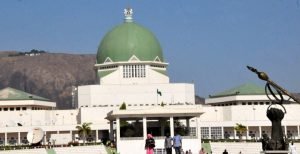As a step to combat inflation, the President Bola Tinubu-led federal government may have implemented a proposal to suspend payment of import duties on staple food items, pharmaceuticals, and other critical items for a six-month period.
This was stated in the President’s next Executive Order, titled “Inflation Reduction and Price Stability (Fiscal Policy Measures) Order 2024.”
Punch NG correspondent saw a paper that did not include the President’s signature, but it was supposed to be signed in April. The document also includes proposals to eliminate tariffs on fertiliser, chicken feed, bread, and cereals.
The presidential order would direct the Ministry of Finance and the Central Bank of Nigeria to develop a strategy for providing low-interest loans to the agricultural, pharmaceutical, and manufacturing sectors.
“The import duty and other tariffs are to be suspended on the following for six months: Staple food items; raw materials and other direct inputs used for manufacturing: Inputs for agriculture production include fertilisers, seedlings, and chemicals; pharmaceutical products; poultry feeds; flour; and grains,” the document read in part.
Tinubu is also likely to suspend the value-added tax on automotive gas oil, some basic food items and semi-processed staple food items such as noodles and pasta, raw-material inputs for the manufacture of food items, electricity, and public transportation, as well as agricultural inputs, produce, and pharmaceutical products for the rest of the year.
“Suspension of Specific Taxes and Levies: For six months, the order suspends various taxes and levies, such as road haulage tax and other transportation-related charges; fees on bicycles, trucks, canoes, wheelbarrows, and carts; business premises registration; taxes and levies on shops, kiosks, and markets; animal trade and produce sales tax.”
The document also makes the following recommendations: import duty and VAT suspension on certain commodities, including millers’ importation of paddy rice, and an import duty exchange rate peg.
Meanwhile, the federal government’s proposed plan contradicts Tinubu’s previous pronouncements about food imports from earlier this year.
At an event with All Progressive Congress state chairpersons, Tinunu stated that his administration would not accept food imports but would instead turn the country’s scarcity into abundance.
“Fertilisers are being supplied to farmers as we speak. Agriculture and economic diversification provide the answers to our problems.
“We will not continue to import food. We know how to turn lack into abundance, and the world will watch us do it again,’’ he said.
In Nigeria, a food crisis looms huge, threatening the country’s stability. Food prices have risen dramatically, with food inflation hitting 40.5 percent.
Rice, a dietary staple, has been one of the hardest-hit commodities. Rice prices have risen by 169 percent in just the last year, reaching about N90,000 per bag in March and April.
This significant spike in food expenses is putting a tremendous strain on households across the country, aggravating an already shaky economy.
It is anticipated that over 31 million Nigerians will face severe food shortages by August of this year.
Furthermore, Tinubu intends to prohibit the payment of taxes and levies in foreign currency via executive order.
To relieve pressure on the naira, the decree directs that all levels of government and their agencies prioritise the purchase of made-in-Nigeria goods and services.
A part of the document read, “Governments at all levels and their agencies shall patronise made in Nigeria goods and services to the extent possible.
“Payments of taxes and levies in foreign currency shall be discontinued to enable the payers to pay in Naira, while non-critical spending plans by any MDA involving foreign exchange costs shall be put on hold. States and local governments are encouraged to support these tax suspensions to ensure broad-based relief for businesses and consumers.”
Dr. Muda Yusuf, Chief Executive Officer of the Centre for the Promotion of Private Enterprise, praised the stabilisation plan, noting that if implemented, it will solve pressing economic challenges that real sector investors are concerned about.
Muda, speaking in an interview, said, “The proposed Accelerated Stabilisation and Advancement Plan is a laudable proposition coming from the Finance Minister. It addresses many of the burning economic issues bothering real-sector investors.
“The plan contains robust and comprehensive fiscal policy measures that stakeholders in the real economy have clamoured for over the past year. It addresses the concerns of investors about high interest rates, the high cost of cargo clearance at the ports, and high import duty regimes.
“The relaxation of import duties on critical raw materials for manufacturers would calm the raging inflationary pressures in the economy, especially food inflation. The fiscal measures reflect the responsiveness of the administration to the concerns of investors in the real economy. We urge expeditious implementation of the plan, once approved by the president.”










